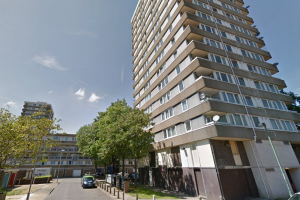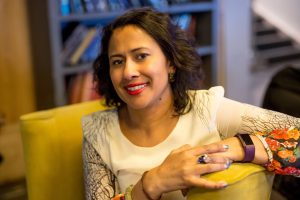About 18 months ago I stood before the SMT at their inaugural structural inequality development session, a programme I had designed. I was terrified. This was my big chance to put into action all that I had learned as an activist and as a more junior member of staff. Meaningful and sustainable change starts with leadership commitment. Why was I so frightened? This was exactly the job I had been asked to do. But, as I think any person of colour will tell you, it feels like you are a flashing beacon when you stand in front of a group of (mostly white) people and tell them that there is inequality all around us, that there is racism around us and, as the leaders of the organisation, that it is their job to act. I was pleased that day that the response was overwhelmingly positive. There was a real thirst for knowledge and an appetite for action.
Since then, we have seen gradual changes and improvements. However, the brutal murder of George Floyd has shown us that we don’t have the luxury of time. Our community need us to do something now. Our steady strategic action plans move too slowly for the toxic, pervasive and all-consuming virus that is racism. Our Race Equality Chartermark self-assessment tells us we have a lot to do. Our recruitment processes are not operating fairly, the BME attainment gap shows not all our students are provided with the opportunity to attain according to their academic potential. Crucially, while we have a lot of ‘BAME’ (Black, Asian and Minority Ethnic) staff and students, we have far too few black staff and students. Recognising and naming this is important if we are going to progress.
I have a friend, an amazing black man of Jamaican heritage, who is an activist and a leader Rob Neil OBE (Order of the British Empire or Obviously Black Everyday – you take your pick!) Rob talks about his journey – that it was only some 10 years into his career that he ‘became’ black, having formerly perceived himself to be ‘colourless’; that merit had no colour; that if he worked hard enough, he would succeed.
I feel the same. Here I am not far off my half century. Little, old, Sarah Guerra, the brown girl that started life in Edmonton Green on the Joyce Avenue Estate. That I find myself as Director of Equality, Diversity and Inclusion at King’s College London is improbable. Don’t get me wrong, I have always been bright and capable. My Trinidadian dad schooled me in arithmetic and letters from the earliest age, and I arrived at school way more advanced than the others in my class. But I, like many others, went through school, college, and university being passively or actively discouraged and urged to lower my ambitions and expectations. It’s a cliché, I know, but it’s true, that in parallel to that, I had the constant refrain at home – ‘you’ve got to be twice as good, Sarah’. At the same time as all of that coded and not-so-coded messaging – what we today know as implicit racism – hardly ever did the fact that I was brown-skinned figure out loud in a conversation or, for many years, in my own mind.
It was there as clear as day, but not something to be mentioned. I became a ‘black’ woman maybe in my early twenties when I started to build my own race consciousness and fought off the imposter syndrome demons.
Today, as, arguably, a firmly middle-class woman, a mother of dual-heritage children, and an EDI practitioner, I have to continuously reflect on how to tackle racism without perpetuating, for my daughters, that same imposter syndrome. Supporting King’s on its path to equality improvement, I carry with me the many years’ experience of ‘the fight’; of the anger and disappointment, but also the joy of hope and the energy that comes from having been able to make a difference.
I’ve been at King’s for 3.5 years now. I find us to be an organisation of enormous heart and ambition. We are also complex, and can be slow and ponderous much of the time. I am proud to work here and to contribute to our staff, students, education, research and vision for the world. As a woman of colour, and a human being, I can also attest to being regularly exhausted by the need to second guess how I might be received or interpreted, by the need to have the conversation, and by the overwhelming task that is dismantling structural inequality. As a senior leader, I recognise I am in a position of privilege and am buffered and deferred to in a way that many more junior colleagues are not. Yet racism – or the fear of it – still touches me most days.
These last few weeks have been some of the most intense of my life. We always talk about ‘what’s the burning platform’ – and never in all my years has the heat been so strong. The eruption of world feeling and attention to anti-black racism has created a window of opportunity for a step change.
King’s, without a doubt, still has a lot to do and has made mistakes. But, personally, it was utterly refreshing in my conversations with our Principal and Provosts (and many others) to not be faced with the task of having to persuade them and instead to be met with their demand and determination to tackle the roots of inequality.
I am proud that we have responded so substantially and fully, recognising that you all want and need more commitment to anti-racism than words on a page.
The following resources were suggested and requested by our amazing Race Equality Network colleagues, a network that had its first birthday very recently. They wanted to show solidarity with staff and create a safe and supportive space for us to discuss various topics around race. To give people ‘permission’ to say what’s on their mind and share their feelings and resources. They and I would like to hear from you and offer any support you need.
A clear message from our recent leadership summit was that there is a difference between not being racist and choosing to be actively anti-racist. One way we are enforcing that commitment is to include EDI-related issues in every issue of King’s Essentials, to continue to build our EDI work into the DNA of King’s. That is what we must all strive for.
I originally wrote this piece to accompany the Race Equality at King’s Splash page. I was at that point advised it wasn’t suitable, so I am publishing here as a blog instead as I wanted people to read it. We will be holding further follow up summits with Heads of Department, BME ECRs and PIs in the autumn to deepen and extend our anti-racism work. Look out for details on those.
In the meantime, you can get involved in the efforts we’re sharing with you here. Join our incredible staff networks and get involved in the wonderful, intersectional work they’re doing. Engage with the training opportunities we have on offer, including Diversity Matters. Have conversations, commit to self-education, and play your part in making sure King’s is a safe and welcoming place for everyone. Are you a budget holder? A hiring manager? You can take direct action to examine how these things are supporting our ambitions to tackle racism. Everyone can also pay attention to who is speaking, notice who is around you, choose to disrupt your social media or reading with different voices, and call out racism and microaggressions when you see them.
Most of all, as you read, please ask yourself: what is my contribution? How do I contribute to the problem? What power do I hold? More importantly, how do I contribute to the solution?
I’d like to thank Jenny Agha, VJ Sidhu and Rob Neil for supporting me in writing this and helping reinforce my courage to say what needs to be said.

